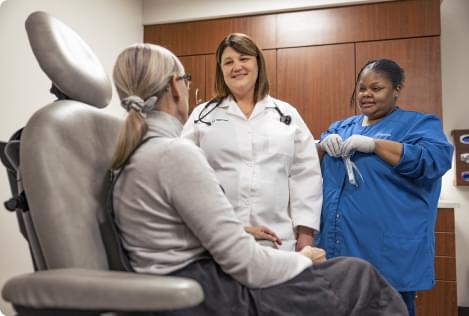| Study Name Sort ascending | Description | Trial Category | Trial SubCategory |
|---|---|---|---|
| NRG-LU007 | This study is comparing effectiveness of atezolizumab alone vs atezolizumab and radiation. You must be diagnosed with extensive stage small cell lung cancer. | Cancer | Small Cell Lung |
| NRG-LU002 | The purpose of this study is to compare the effectiveness of chemo alone vs SBRT (stereotactic body radiation therapy) and chemo. You must be diagnosed with metastatic non-small cell lung cancer (NSCLC). You must have already received first line therapy. | Cancer | Metastatic Non-Small Cell Lung |
| NRG-HN005 | The purpose of this study is to determine if a reduced dose of radiation therapy is as effective as the standard dose of radiation. You must be diagnosed with P16-Positive Oropharyngeal cancer. Your smoking history must be <10 pack-years. | Cancer | Oropharyngeal |
| NRG-GY019 | The purpose of this study is to compare paclitaxel, carboplatin and maintenace letrozole vs letrozole alone. You must be diagnosed with Stage 2-4 serous ovarian cancer. | Cancer | Serous Ovarian |
| NRG-GU010 | The purpose of this study is to determine if it is effective to use your genomic risk to determine the level of treatment you need. Those with a lower genomic risk get a de-intensified treatment and those with a higher risk get a intensified treatment. You must be diagnosed with unfavorable intermediate risk prostate cancer. | Cancer | Prostate |
| NRG-GU009 | The purpose of this study is to determine if it is effective to use your genomic risk to determine the level of treatment you need. Those with a lower genomic risk get a de-intensified treatment and those with a higher risk get a intensified treatment. You must be diagnosed with high-risk prostate cancer. | Cancer | Prostate |
| NRG-GI008 | The purpose of this study to use blood draws looking at the tumor DNA in the blood to determine need for chemotherapy. You must be diagnosed with stage 3 colon cancer. | Cancer | Colon |
| NRG-GI005 | The purpose of this study is to look at the tumor DNA with blood draws to determine risk of cancer recurrance. You must be diagnosed with Stage 2A colon cancer. | Cancer | Colon |
| NRG-GI004 | The purpose of this study is to look at the effectiveness of Atezolizumab alone or in combination with other chemo regimens. You must be diagnosed with metastatic colorectal cancer with a DNA mismatch repair deficiency and BRAF gene mutation. | Cancer | Metastatic Colorectal |
| NRG-BR009 | The purpose of this study is treat breast cancer after surgery. You must have estrogen positive breast cancer and an oncotype score ≤25. This study looks at adding chemotherapy to the standard treatment of ovarian function suppression and aromatase inhibitor. | Cancer | Breast |
| Node X | Participants must have participated in a prior study with the investigational drug etripamil (the NODE-301, NODE-302, or NODE-303 study). The study is being done to determine the safety of etripamil 70 mg for the treatment of multiple episodes of PSVT in an at-home setting. | Heart & Vascular | Cardiac Arrhythmia |
| LUNGMAP | This is a screening study to eavluate biomarker-driven therapies and immunotherapies in previously treated Non-Small Cell Lung Cancer (NSCLC). You must be diagnosed with Stage 4 or recurrent NSCLC. Tissue is sent for screening and patient can be assigned to a sub study based on mutations found. | Cancer | Metastatic Non-Small Cell Lung |
| Librexia AF | The purpose of this research study is to compare the effects of an experimental drug, milvexian, to the comparator drug, apixaban, to determine if it is safe and useful in reducing the risk of stroke and blood clots outside the brain (non-central nervous system (CNS) systemic embolism) in participants with atrial fibrillation. | Heart & Vascular | Atrial Fibrillation |
| Librexia ACS | The purpose of this study is to see if an experimental drug, called milvexian is safe, effective and useful in reducing risk of developing blood clots, stroke, or another heart attack among subjects with a recent heart attack or angina (chest pain) episode. An experimental drug is one that is not approved by the United States Food and Drug Administration (FDA). | Heart & Vascular | Atrial Fibrillation |
| ISPY 2 | This study uses the type of breast cancer you are diagnosed with to determine what treatment you are given. You must be diagnosed with stage 2 or stage 3 breast cancer. This study requires regular MRI's. | Cancer | Breast |
| Iocyte Faraday STEMI drug | The purpose of this study is to evaluate the efficacy and safety of the study drug vs placebo in subjects with an anterior ST-elevation myocardial infarction (STEMI) undergoing primary percutaneous coronary intervention (pPCI). | Heart & Vascular | Heart Failure |
| Intuitive Surgical Ureter | The purpose of this study is to investigate whether the study drug may allow the surgeon to better see the ureters when using the da Vinci Surgical System for gynecological surgery. | Surgery | Gynecology |
| Improving Continuous Positive Airway | Improving Continuous Positive Airway Pressure Adherence in Patients with Obstructive Sleep Apnea: Impact of Patient and Family Engagement (Improving CPAP Adherence | Pulmonary | Respiratory |
| GU012 | The purpose of this study is to compare standard immunotherapy with immunotherapy and radiation. You must be diagnosed with metastatic renal cell cancer and have not had surgery for this cancer. | Cancer | Metastatic Renal Cell |
| ESsCAPE | The main objective of the trial is to assess the efficacy and safety of the drug trimodulin as adjunctive treatment to standard of care compared to placebo plus standard of care in adults hospitalized with severe community-acquired pneumonia on invasive mechanical ventilation. | Pulmonary | Respiratory |
| EAY191-S3 ComboMATCH | The purpose of this study is to determine the effectiveness of Paclitaxel and Ipatasertib in patients who progressed within 6 months of taxane-based therapy. You must have a a AKT-Altered cancer. You must have a locally advanced, unresectable or metastatic cancer. | Cancer | Solid Tumors (non-breast) |
| EAY191-N5 | This study is for patient's who have HER2+ gynecologic cancers or other solid tumors. Cannot have breast cancer. You must have recurrent disease or progressed on treatment. | Cancer | Her2+ Solid Tumors |
| EAY191-N4 | The purpose of this study is to compare Selumetinib and Olaparib vs Selumetinib alone. You must be diagnosed with recurrent or persisent Ovarian or Endometiral cancer. Your cancer must have a RAS pathway mutation. | Cancer | Ovarian & Endometrial |
| EAY191-N2 ComboMATCH | This study is for people diagnosed with hormone receptor positive breast cancer that has spread. A NF1 gene mutation must exist. | Cancer | Metastatic Breast |
| EAY191-E5 | This study is for patients who have a KRAS G12C mutation and advanced/metastatic solid tumors. Your cancer must have progressed on standard of care therapy. You cannot have colorectal cancer or non-small cell lung cancer. | Cancer | Solid Tumors |
| EAY191-E4 ComboMATCH | The purpose of this study is to determine the effectiveness of nilotinib and paclitaxel in patients with prior taxane treated solid tumors. You must have had at least one prior line of therapy in the metastatic setting. | Cancer | Solid Tumors |
| EAY191-A6 ComboMATCH | The purpose of this study is to see if adding Binimetinib in combination with FOLFOX is more effective treatment. You must be diagnosed with biliary tract cancer with a MAPK pathway gene mutation. | Cancer | Biliary |
| EAY191 ComboMATCH | The purpose of this study is to find targeted therapy for specific gene mutations in metastatic or advanced cancer. You must have progressed on standard of care treatment or have a cancer which has no standard of care treatment. If select mutations are found you may be eligible for a sub-study. | Cancer | Genomics |
| EAA181 | The purpose of this study is to determine what consolidation regimen is most effective. Patients cannot get stem cell transplant until first relapse or later. You must have newly diagnosed multiple myeloma (MM). | Cancer | Multiple Myeloma |
| EAA173 | The purpose of this study is determine if dararumumab enhances the effectiveness of revlimid in patients with smoldering myeloma. You must be diagnosed with asymptomatic high risk smoldering multiple myeloma. | Cancer | Smoldering Myeloma |
Unsupported Browser! This website will offer limited functionality in this browser. We only support the recent versions of major browsers like Chrome, Firefox, Safari, and Edge.


